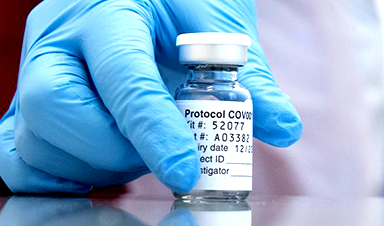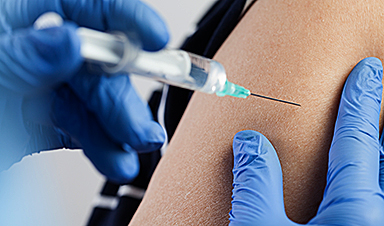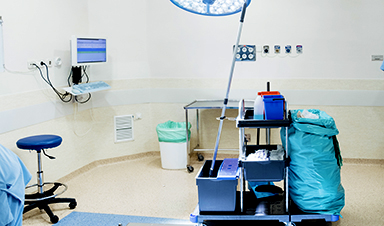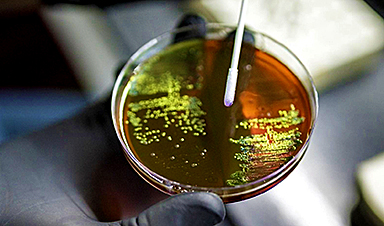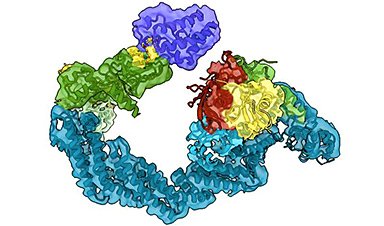The University of Oxford, in collaboration with AstraZeneca plc, today announces interim trial data from its Phase III trials that show its candidate vaccine, ChAdOx1 nCoV-2019, is effective at preventing COVID-19 (SARS-CoV-2) and offers a high level of protection.
Our vaccine work is progressing quickly. To ensure you have the latest information or to find out more about the trial, please visit the Oxford COVID-19 vaccine web hub or visit the COVID-19 trial website.
- Phase 3 interim analysis including 131 Covid-19 cases indicates that the vaccine is 70.4% effective when combining data from two dosing regimens
- In the two different dose regimens vaccine efficacy was 90% in one and 62% in the other
- Higher efficacy regimen used a halved first dose and standard second dose
- Early indication that vaccine could reduce virus transmission from an observed reduction in asymptomatic infections
- There were no hospitalised or severe cases in anyone who received the vaccine
- Large safety database from over 24,000 volunteers from clinical trials in the UK, Brazil and South Africa, with follow up since April
- Crucially, vaccine can be easily administered in existing healthcare systems, stored at ‘fridge temperature’ (2-8 °C) and distributed using existing logistics
- Large scale manufacturing ongoing in over 10 countries to support equitable global access
Professor Andrew Pollard, Director of the Oxford Vaccine Group and Chief Investigator of the Oxford Vaccine Trial, said:
‘These findings show that we have an effective vaccine that will save many lives. Excitingly, we’ve found that one of our dosing regimens may be around 90% effective and if this dosing regimen is used, more people could be vaccinated with planned vaccine supply. Today’s announcement is only possible thanks to the many volunteers in our trial, and the hard working and talented team of researchers based around the world.’
Professor Sarah Gilbert, Professor of Vaccinology at the University of Oxford, said:
‘The announcement today takes us another step closer to the time when we can use vaccines to bring an end to the devastation caused by SARS-CoV-2. We will continue to work to provide the detailed information to regulators. It has been a privilege to be part of this multi-national effort which will reap benefits for the whole world.’
Top Image Credit: John Cairns
Post by Amanda Scott, NA CEO. Follow her on twitter @tantriclens
Thanks to Heinz V. Hoenen. Follow him on twitter: @HeinzVHoenen
News
Harvard Study Links Popular Plastic Ingredient to DNA Damage
Phthalate affects egg formation in C. elegans, resulting in abnormal chromosome numbers. A recent study conducted on roundworms has discovered that a common plastic ingredient can cause DNA strand breaks, leading to egg cells with an abnormal [...]
New research finds that subtle eye movements optimize vision
Our ability to see starts with the light-sensitive photoreceptor cells in our eyes. A specific region of the retina, termed fovea, is responsible for sharp vision. Here, the color-sensitive cone photoreceptors allow us to [...]
Scientists Were Wrong: Plants Absorb 31% More CO2 Than Previously Thought
New research shows plants absorb 31% more CO2 than previously estimated, raising the global GPP to 157 petagrams per year. Using carbonyl sulfide as a proxy for photosynthesis, this study highlights tropical rainforests’ critical role [...]
Doctors test first mRNA vaccine against norovirus
According to the Robert Koch Institute (RKI), the norovirus, which is widespread worldwide, is the cause of a large proportion of gastrointestinal infections. Those who catch the virus suffer from nausea, diarrhea and vomiting. [...]
Study reveals resistance of Pseudomonas aeruginosa to common cleaning agents
A new study reveals widespread resistance of a major bacterial pathogen to the active ingredients in cleaning agents commonly used in hospitals and homes. The American Chemical Society Infectious Diseases published the research, led [...]
AI’s Next Frontier: System 0 and the Future of Human Thought
“System 0” represents an emerging cognitive tool powered by AI that works alongside human intuition and analysis to enhance cognitive abilities. This new system promises to support complex decision-making and problem-solving but requires careful [...]
The Global Nanomedicine Market: Key Players and Emerging Technologies in Healthcare
This article provides an overview of the global nanomedicine market, highlighting key players, emerging technologies, and the challenges and opportunities that influence its growth and commercialization in the healthcare sector. Nanomedicines are nanotechnology-based drug products [...]
Scientists Have Discovered Toxic “Forever Chemicals” in Bottled Water
Scientists have found toxic PFAS in drinking water samples from around the world, with higher levels in tap water from China compared to the UK. Boiling water or using a filtration jug can reduce [...]
Urban Microbes Are Eating Disinfectants – Are We Fueling a New Health Threat?
New research reveals that microbes in urban environments are evolving to withstand the very cleaning agents designed to eliminate them. The study also uncovers new strains in Hong Kong, previously only found in the [...]
Startling Study Shows High-Potency Cannabis Alters DNA
The study shows that frequent use of high-potency cannabis alters DNA, affecting genes related to energy and immune function. These changes differ between those with and without psychosis, suggesting cannabis use could influence mental health through biological [...]
New nanotherapy targets artery inflammation in cardiovascular disease
Inflammation of the arteries is a primary precursor and driver of cardiovascular disease—the No. 1 killer of people in the United States. This inflammation is associated with the buildup of dangerous plaque inside the [...]
Revolutionary Nanoparticle Therapy for Prostate Cancer
A groundbreaking research effort involving teams from the University of Virginia, Mount Sinai, the University of Michigan, the University of Texas, and others has displayed the clinical efficacy of an innovative therapy that utilizes nanoparticles and [...]
Antibody engineering drives innovation in drug development
Monoclonal antibodies (mAbs) are used to prevent, detect, and treat a broad spectrum of non-communicable and communicable diseases. Over the past few years, the market for mAbs has grown exponentially with an expected compound [...]
Breakthrough Study Reveals How Bladder Cancer Starts and Spreads
Researchers found that DNA mutations from antiviral enzymes and chemotherapy fuel early bladder cancer, while abnormal circular DNA in tumor cells drives resistance to therapy. These discoveries open new therapeutic avenues. A groundbreaking study led by [...]
AI and Quantum Mechanics Accelerate Drug Discovery
A recent article published in the Journal of Chemical Information and Modeling researchers at Southern Methodist University (SMU) have developed SmartCADD, an open-source virtual tool designed to speed [...]
Targeting ‘undruggable’ diseases: Researchers reveal new levels of detail in targeted protein degradation
Researchers at the University of Dundee have revealed in the greatest detail yet the workings of molecules called protein degraders which can be deployed to combat what have previously been regarded as "undruggable" diseases, [...]
